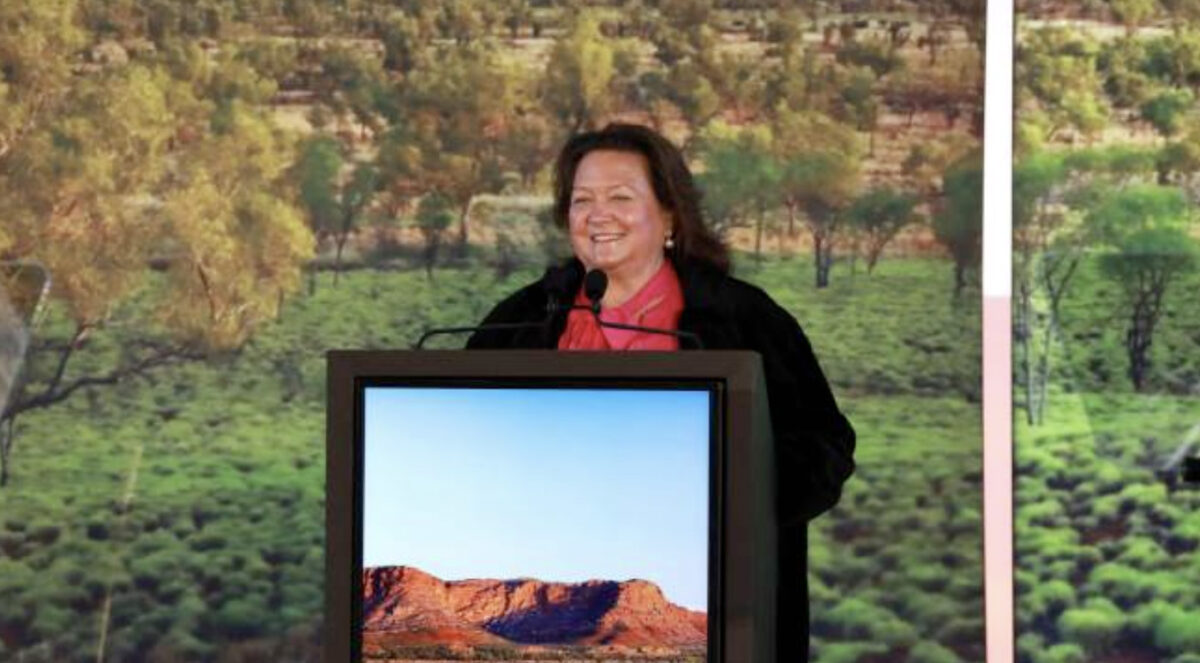Gina Rinehart urges Albanese government to ease burden of net zero emissions on farmers as she calls for drastic red tape cut
The executive chair of Hancock Prospecting and Hancock Agriculture Gina Rinehart used the first Bush Summit in Western Australia to urge state and federal government to massively cut red tape, return regional revenue to the bush and ease the pain of net zero policies on farmers. Ms Rinehart delivered the keynote address at The Australian’s summit in Perth on Monday where she offered a list of key reforms to improve the lives of rural Australians.


Australia’s richest person Gina Rinehart has delivered an impassioned plea to the Albanese and state governments to ease the burden of costly net zero emissions policies on farmers.
The executive chair of Hancock Prospecting and Hancock Agriculture Gina Rinehart used the first Bush Summit in Western Australia to urge state and federal government to massively cut red tape, return regional revenue to the bush and ease the pain of net zero policies on farmers.
After five years, the Bush Summit – sponsored by Ms Rinehart’s Hancock Prospecting – has ventured outside of New South Wales and toured Australia’s regions.
Ms Rinehart delivered the keynote address at The Australian’s summit in Perth on Monday where she offered a list of key reforms to improve the lives of rural Australians.
Chief among her six reform proposals was a plea to ease the burden of net zero emissions policies on farmers, urging governments to waive or pay for transition costs higher than $200,000.
The Western Australian billionaire said moving to electric vehicles alone would “cost a fortune” for the farmers and pastoralists, while conceding the mining industry was likely more equipped to bare the burden of the hefty bill.
“You actually have to add up the expense of these net zero policies on farmers,” Ms Rinehart said on Monday.
“It’s going to cost a fortune that farmers and pastoralists don’t have, without a mining company in their back pocket. They just don’t have this money to be able to invest.”
She then called on governments to meet the costs of their own net zero policies, arguing the agricultural sector was extremely unlikely to be able to afford to undergo a massive transition without assistance.
“I’m suggesting those in agriculture don’t need to spend more than $200,000 of their own money on net zero requirements. That won’t buy all that I’ve just mentioned, let alone part of it,” Ms Rinehart said after pointing to the costs of the solar generators and electric vehicles required to meet net zero targets.
“The rest is to be met by governments – real assistance with policies they want to implement through net zero, otherwise most farmers and others in agriculture cannot afford net zero, they will have to leave agriculture.
“The consequence is the Aussies in the towns will see huge food price increases and fresh food shortages.”
In keeping with the theme of easing costs on farmers, Ms Rinehart also called on the Commonwealth to remove the ban on a domestic nuclear energy industry.
Global and domestic companies have been banned from capitalising on Australia’s vast uranium reserves to provide cheap clean energy after the Howard government introduced a moratorium on nuclear power in the late-1990s.
Ms Rinehart, whose company Hancock Prospecting grew out of the iron ore discoveries of her late-father Lang Hancock, said the alternative would majorly disrupt the lives of those in Australia’s regions.
“Let’s not upset many farmers with bird killing wind generators and massive solar panel stretches and bring on clean safe nuclear energy, please Australia,” she said.
Her keynote address also focused on implementing a massive program of cutting regulation and red tape.
On top the agenda was an ambitious plan to sunset all new regulation after four years, requiring government bureaucrats to “sign their names and provide reasons” why red tape should continue.
Under her proposal 75 per cent of a department would need to support reinstatement, before the specific legislation is referred to a committee to determine whether its extended.
Another position raised by Ms Rinehart – which has been partially adopted by the government – was her call to remove work hour caps on pensioners, veterans and university students for government payments.
Currently pensioners are only able to earn up to $11,800 before their benefits begin to decrease which was increased from $7800 after the Albanese government’s Jobs and Skills Summit last year.
However, she argued the cap needed to be scrapped altogether in a bid to urgently fill the much-needed job shortage in the bush.
“Just imagine those smiles when we can finally fill those jobs in the bush and see hospitals and health centres hours and effectiveness improved,” she said.
“If we could cut some of the paperwork and the regulations here we would find a lot of Aussies who would very much like to work as well – they’re just restricted by government.”
Working off one of the key themes of the summits, Ms Rinehart called for a commitment to “see more of the moneys earnt in the bush, actually returned to the bush”.
She said rural hospitals and airstrips should be the “best equipped and luxurious” in the country given a large portion of Australia’s wealth was derived from regional areas.
Ms Rinehart also proposed the states and the commonwealth create special economic zones across northern Australia.
“These operate successfully around the world but not in Australia – (they’re) successful because they cut both government tape and tax,” Ms Rinehart said.
“There are now more than 8,000 of these zones operating successfully around the world.
“Together let’s lead the way to drive such very beneficial economic zones. Indeed I don’t know a better way to secure a very worthwhile theme of this summit.”
